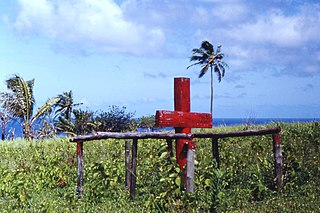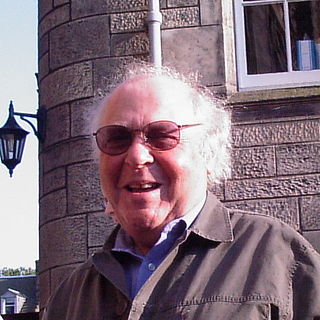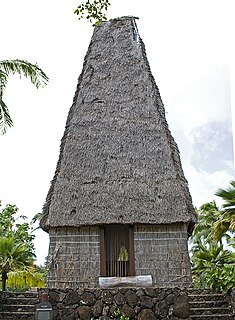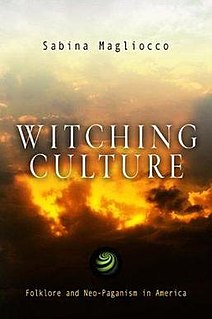
A cargo cult is a millenarian belief system in which adherents perform rituals which they believe will cause a more technologically advanced society to deliver goods. These cults were first described in Melanesia in the wake of contact with allied military forces during the Second World War.

Marshall David Sahlins is an American cultural anthropologist best known for his ethnographic work in the Pacific and for his contributions to anthropological theory. He is currently Charles F. Grey Distinguished Service Professor Emeritus of Anthropology and of Social Sciences at the University of Chicago.

Arjun Appadurai is an Indian-American anthropologist recognized as a major theorist in globalization studies. In his anthropological work, he discusses the importance of the modernity of nation states and globalization.
Bati are the traditional warriors of the Fiji Islands the word itself loosely translated means soldier, bodyguard in Fijian. it is derived from the word meaning teeth or edge and In old Fiji two types of subjection were recognized called Qali and Bati, The Qali was a province or town subject to a Chief town and Bati denotes those which are not directly subject but less respected than the Qali, the Bati bordered an area subject to the Chief and provided him with a service, and from here derives the terms Mataqali and Bati.
Morton Herbert Fried, was a distinguished Professor of Anthropology at Columbia University in New York City from 1950 until his death in 1986. He made considerable contributions to the fields of social and political theory.
Michael Eugene Harkin is one of the leading anthropologists in the United States specializing in the ethnohistory of indigenous people of the western U.S. and Canada. He is currently professor and former chair of anthropology at the University of Wyoming, having previously taught at Emory University and Montana State University. In 2011 he was Fulbright Distinguished Chair in Cultural Studies at the Karl-Franzens University in Graz, Austria, and in 2007 he was a visiting professor at Shanghai University.
Tanya Marie Luhrmann is an American psychological anthropologist known for her studies of modern-day witches, charismatic Christians, and studies of how culture shapes psychotic, dissociative, and related experiences. She has also studied culture and morality, and the training of psychiatrists. She is Watkins University Professor in the Anthropology Department at Stanford University.

Fiji is a mixed society religiously with most people being Christian but with sizable Hindu and Muslim minorities. Religion tends to split along ethnic lines with most Indigenous Fijians being Christian and most Indo-Fijians being either Hindu or Muslim.
Fijian tradition and ceremony is a living way of life that has remained intact for millennia, evolving as the Fijian nation has modernised over time, with various external influences from Pacific neighbours, and European and Asian society. The term Fijian in this article refers to "indigenous Fijians" or "I Taukei" as the term Fijian generally includes all citizens of Fiji. This article is a general overview of various aspects of Fijian tradition, social structure and ceremony, much of it from the Bauan Fijian tradition. There are variations from province to province. Many social intricacies depend on one's inherited social position and the occasion one is confronted with: each will have a particular social etiquette. The Fijian terms in this article are most often of the Bauan dialect.
Nancy Oestreich Lurie was an American anthropologist who specialized in the study of North American Indian history and culture. Lurie’s research specialties were ethnohistory, action anthropology and museology; her areal focus was on North American Indians, especially the Ho-Chunk and the Dogrib (Tlicho) of the Canadian NWT; and the comparative study of territorial minorities.

The Indian Platoon was the only Fiji Indian military unit created in Fiji and existed from 1934 to 1941. The platoon was eventually disbanded following a dispute over pay.
Elizabeth Hill Boone is an American art historian, ethnohistorian and academic, specialising in the study of Latin American art and in particular the early colonial and pre-Columbian art, iconography and pictoral codices associated with the Mixtec, Aztec and other Mesoamerican cultures in the central Mexican region. Her extensive published research covers investigations into the nature of Aztec writing, the symbolism and structure of Aztec art and iconography and the interpretation of Mixtec and Aztec codices.

Jean Comaroff is Professor of African and African American Studies and of Anthropology, Oppenheimer Fellow in African Studies at Harvard University. She is an expert on the effects of colonialism on people in Southern Africa. Until 2012, Jean was the Bernard E. & Ellen C. Sunny Distinguished Service Professor of Anthropology and of Social Sciences at the University of Chicago and Honorary Professor of Anthropology at the University of Cape Town.
Erminie Wheeler-Voegelin was an anthropologist, folklorist, and ethnohistorian.

Witching Culture: Folklore and Neo-Paganism in America is a folkloric and anthropological study of the Wiccan and wider Pagan community in the United States. It was written by the American anthropologist and folklorist Sabina Magliocco of California State University, Northridge and first published in 2004 by the University of Pennsylvania Press. It was released as a part of a series of academic books titled 'Contemporary Ethnography', edited by the anthropologists Kirin Narayan of the University of Wisconsin and Paul Stoller of West Chester University.

Tu’i Vukinavanua was a Fijian High Chief of the island of Nayau.
Ruth Leah Bunzel was an American anthropologist, known for studying creativity and art among the Zuni people (A:Shiwi), researching the Mayas in Guatemala, and conducting a comparative study of alcoholism in Guatemala and Mexico. Bunzel was one of the first anthropologists to study the creative process, and she was the first American anthropologist to conduct substantial research in Guatemala. Her doctoral dissertation, The Pueblo Potter (1929) was a study of the creative process of art in anthropology and Bunzel was one of the first anthropologists to study the creative process.
Time for Tea: Women, Labor and Post-colonial Politics on an Indian Plantation (2011) is a post-colonial feminist ethnographic critique of labour practices in Indian tea plantations. Through personal interviews, anecdotes and a play, Piya Chatterjee examines the role gender, class, and race play in the production, consumption and circulation of tea. Transcending the realm of local politics and culture, the ethnography reveals the multilayered, multispatial, colonial dimension of gendered labour. She begins by deconstructing the image of the tea box itself to showcase how the image of the exotic tea-plucking women distracts the consumer from the harsh working conditions of plantations. By providing a historical account of the tea industry in India, Chatterjee reveals the intricate link between colonialism and the gendered division of labour in North Bengalese plantations. While gender is her main unit of analysis, Chatterjee explores the way in which colonialism has shaped and continues to shape, the patriarchal and class-based nature of plantations. Coming from a Global South perspective, she demonstrates the intersectionality of gender, class and race, as mutually constitutive mechanisms of oppression. Throughout the novel, she acknowledges her own privilege as a Global South academic and highlights the difficulties of speaking for the subaltern.
Historical anthropology is a historiographical movement which applies methodologies and objectives from Social and Cultural Anthropology to the study of historical societies. Like most such movements, it is understood in different ways by different scholars, and to some may be synonymous with the history of mentalities, cultural history, ethnohistory, microhistory, history from below or Alltagsgeschichte. Anthropologists whose work has been particularly inspirational to historical anthropology include Emile Durkheim, Clifford Geertz, Arnold van Gennep, Jack Goody, Lucien Lévy-Bruhl, Marcel Mauss and Victor Turner.
J. Kēhaulani Kauanui is Kanaka Maoli woman born and raised in California with ties to family in Anahola on the island of Kaua`i and throughout the islands. She is an author, editor, radio producer, educator, serves on advisory boards, and is one of six co-founders of the Native American and Indigenous Studies Association (NAISA). She was awarded a Fulbright (1994-1995) at the University of Auckland in New Zealand where she was affiliated with the Māori Studies department. Her research areas focus on indigeneity & race, settler colonialism, decolonization, anarchism, and gender & sexuality.







